📚 Goodbye BookWyrm, Hello Bookmory
Disclaimer: You know the drill by now. This post is dated October 7th but it’s actually going up on the 8th because I am cheating backdating some entries to keep my Blogtober streak going. It’s cool, I got clearance, we’re good!!
Bye-bye BookWyrm
A couple of weeks ago, I finally deleted my BookWyrm account. It was a long time coming, honestly. While I can definitely appreciate all of the work that went into the software side of things and the community they’re trying to foster, as a book-tracking service it was just very… lacking.
The way BookWyrm works is that you search for your edition of a book within that instance’s database, in my case BookWyrm.social’s. If you were lucky, its listing already existed and you simply needed to mark it as “to be read” or whatever. But for the vast majority of the time I used the site, the books I was trying to look up were either:
- not in the database, meaning you’d have to import it from a different library (like OpenLibrary) or, much more often, manually add the book yourself
- listed multiple times because people were adding different editions as entirely different books, and there were no librarians to merge all these duplicates
It got to the point where I was having to manually add book entries for basically every single thing I was reading. I completely stopped trying to track books that I wanted to read in future because it was such a PITA having to go through that whole process just to add them to my TBR. I found myself making lists of books in Obsidian and tracking my reading progress there because it was quicker.
And if I was doing all of that, what even was the point in using BookWyrm? The social aspects were fine… but I could also just post in the #Bookstodon hashtag and connect with a lot more people. And I could follow my BookWyrm mutuals from Mastodon, so did I even really need to be on BookWyrm to see what people were talking about?
Ultimately my needs were quite different from what BookWyrm was offering. While I will definitely recommend this service to anyone who is looking for a social media book-tracking site that is neither Goodreads nor StoryGraph, I decided it was time for me to move on.
What next?
Back to Obsidian?
I initially thought about restarting my old book collection on Obsidian. Before trying out BookWyrm, I used to track my books using the Book Search plugin. That let me pull data from a bunch of proprietary APIs including Google Books, which was very nice because it meant I could search for books in both English and Japanese, and unless it was something super niche and self-published, I could be reasonably sure to find it.
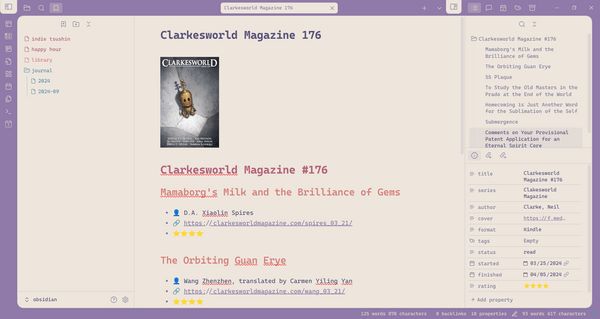
My Obsidian database was pretty barebones but it worked. It was simple to add new book entries and start taking notes in them. I could also import my notes from my Kindle and dump them in here too, making it very easy to find all of my thoughts on any particular book.
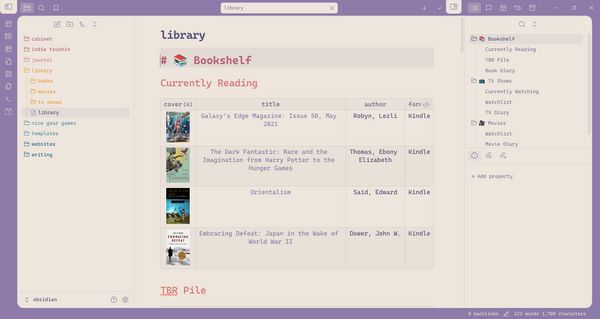
I tried to make it look somewhat visually appealing, and I don’t think I did a bad job. It was serviceable.
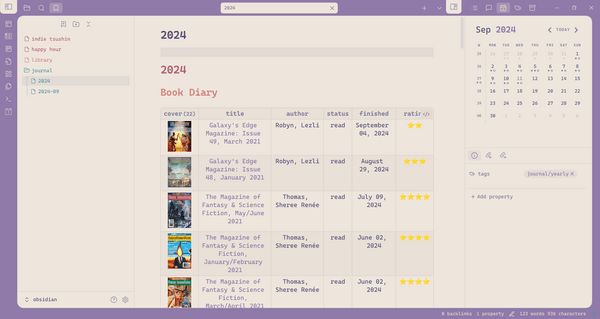
Ultimately though, I started to move away from this style of book-tracking because it, too, was turning into Work. I was spending more time setting things up Just Right than I was actually reading. Also in general, I was starting to sort of… despise the clutter of my Obsidian vault. This was what led me to BookWyrm, which… well, you know what happened there.
Something new?
Maybe I was overthinking this. I didn’t need nor want to make a whole database of notes. I wanted to be spending my time reading, not designing and maintaining all these databases. I suppose I could just list up my books in the back of my planner… but that would run the risk of my forgetting to write something down because I didn’t have my Hobonichi on hand. Maybe I should go old school and make a spreadsheet? But what is a spreadsheet if not a database in miniature, right? Hmm…
Trying out Bookmory
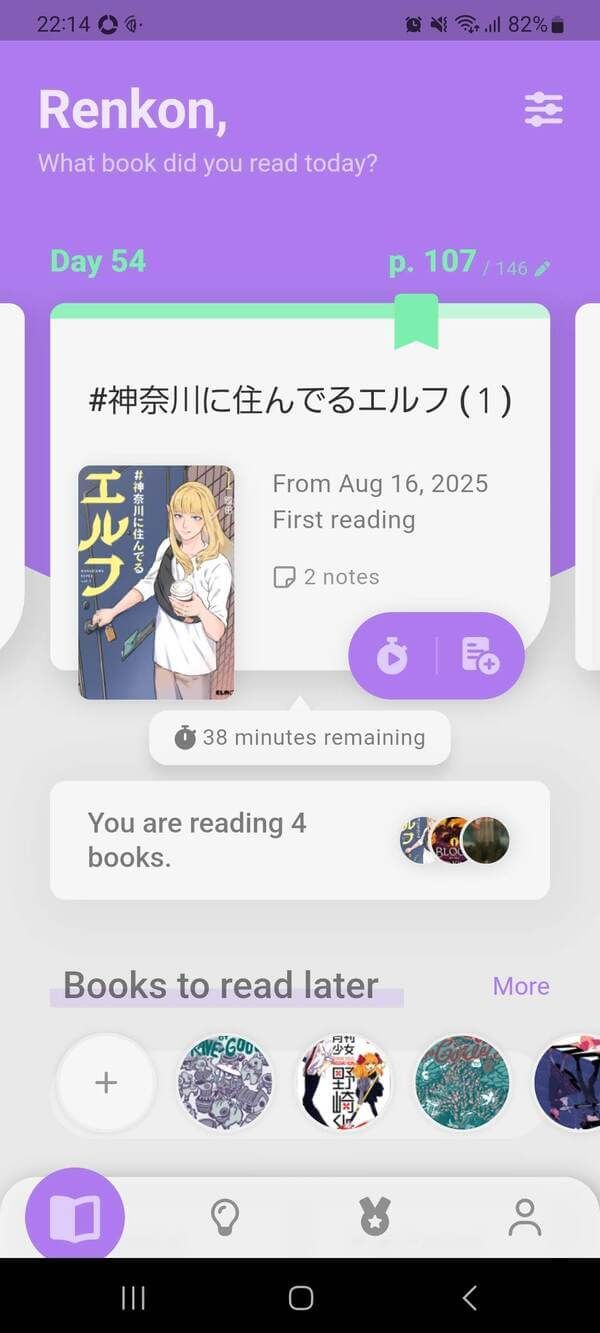
Yes, a big reason why I splurged on a subscription was so I could use a purple theme...
Back when I was searching for an alternative to StoryGraph, I found people talking about Bookmory. It’s a free ad-supported phone app, with a subscription to remove ads and get some extra features. It is not a social network, but you can share your notes and achievements from the app to your social media apps of choice.
I tried it out and liked it so much that I ended up paying for a year subscription 😅 It was about $23 for the year, which is a pretty big bite out of my book budget for what is essentially a themed frontend for a glorified spreadsheet. But it’s been fun so far, and it’s gotten me to have a lot of fun reading again, so I mean… that’s also not nothing, right?
The database
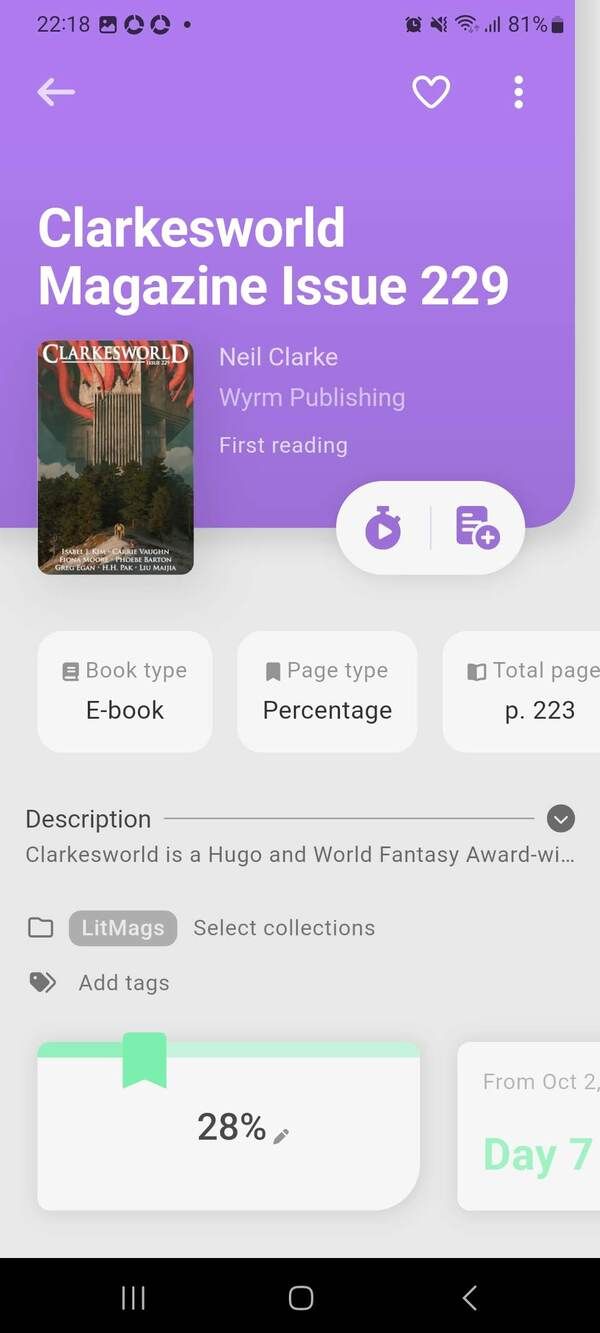
Much like the Obsidian plugin, it pulls from Google APIs so it can find almost all commercial releases and in different languages. If you can’t find something, like if it’s a digital-only indie comic from an online fair, then you can pretty easily add your book entry manually.
Mercifully, blessedly, it is so quick to just add books to my wishlist now. I don’t need to spend a lot of time copy+pasting a bunch of data or setting up a whole lot of database cruft for some books that I may never end up actually reading. I can just search for a book, hit the little heart button, bang, it is in my wishlist where I don’t have to worry about losing it in the jungle of my notes.
The upside is that the database is local to my phone, so nobody can later edit the data (or add a bunch of duplicates instead of creating new editions of existing work). The downside is that it’s all on my phone, meaning I can’t add books from my computer, and need to have my phone on me when reading. Which, I mean… is almost always the case anyway, but my phone is such a distraction when it comes to reading 😔
Timed reading sessions
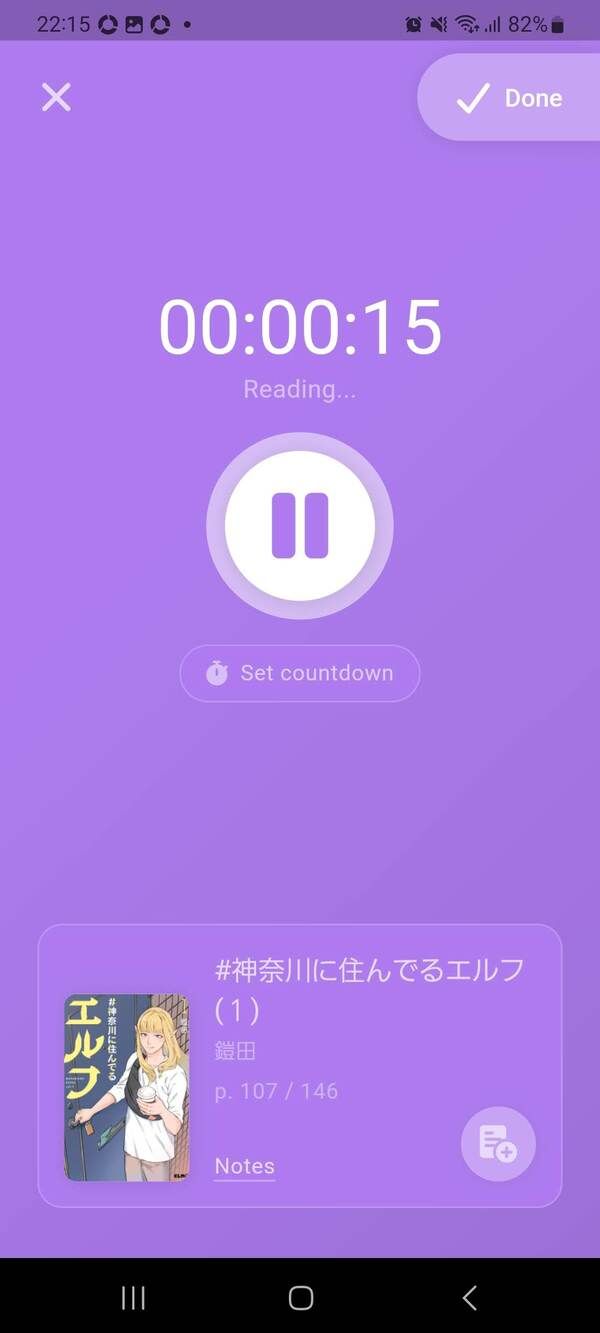
But luckily, even if I always have my phone on me when reading, Bookmory has a neat trick up its sleeve: the timer. With a quick tap I can start the full-screen timer, which is a big motivator for me to not look at my phone.
I’ve been on a pomodoro kick lately so I love the idea of recording my reading sessions using this app. I’ve set a goal of 50 minutes of reading per day (25min for a Japanese book and 25min for something in English). It’s a surprisingly good way to get me to stop doomscrolling, put my phone down, and pick up a book instead.
Notes
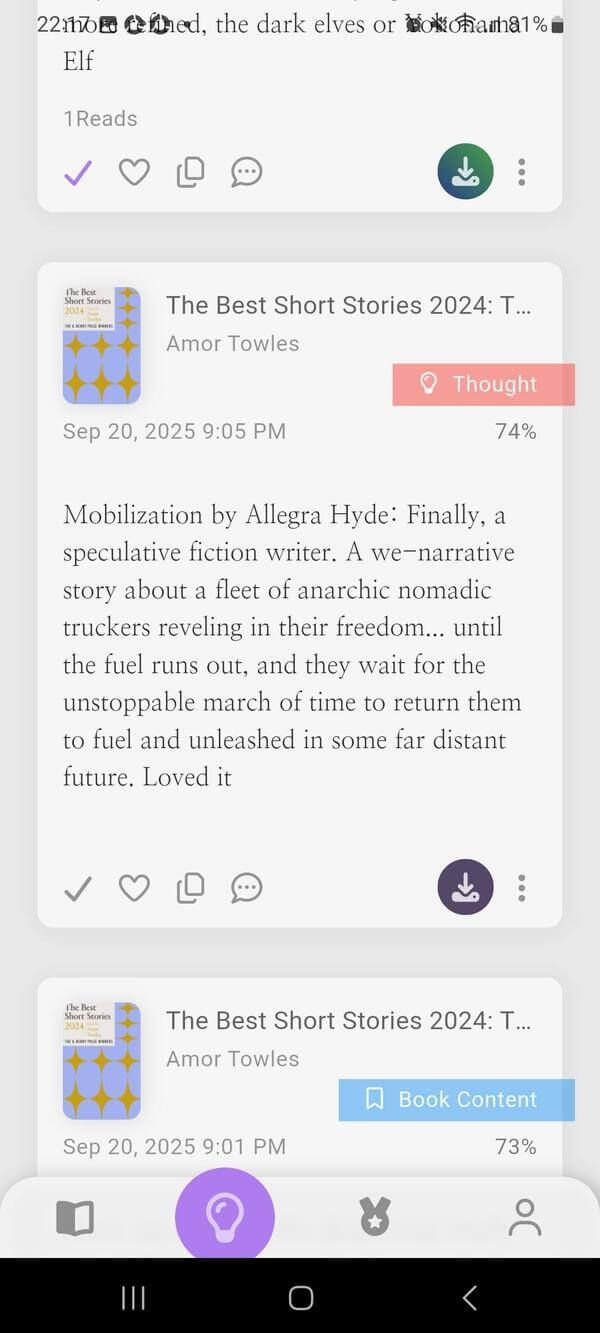
During my reading sessions, I can make a bunch of notes on the stuff I’m reading and flag them as one of four types: Book Content (which I use for quotes and highlights), Summary (to help me collect my thoughts on what it was I just read), Thought (opinions, reviews, other random thoughts), and Question (stuff to look up or reread/write about later). It can also read text from photos, and it even does a pretty decent job of reading my chicken scratch handwriting!

You can snap a photo of whatever it is you're reading, or your handwritten notes, and the app will turn it into text to add as a note for your book entry.
Dopamine hits
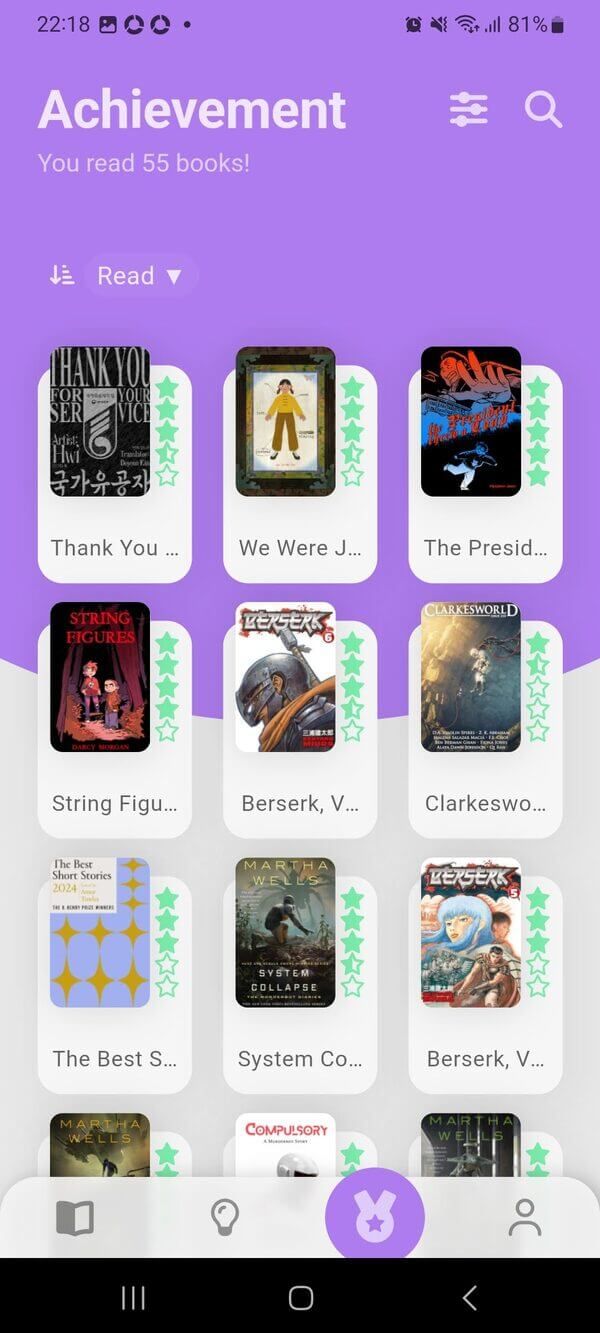
Look, I love racking up a ton of achievements okay, I’m sorry that I’m a ダサい gamer like that. But if you like to gamify your hobbies, Bookmory delivers. You get a little burst of confetti every time you finish a book, hit your daily reading goal, whatever. I am Pavlov’s bookworm over here.
You can also turn these fanfares off if you want. If you hate fun.
Verdict: s’good!
You don’t strictly need Bookmory. You can definitely jury-rig a similar, possibly superior setup using Obsidian plugins. But what I appreciate about Bookmory is that it has all the stuff in it that I would want (keeping my book notes mostly organized in one place, letting me throw stuff into my wishlist/TBR pile to look up later, avoiding a lot of the tedium of manually creating book entries) and none of the stuff I don’t need (AI summaries, rando user reviews). It’s not going to be for everyone, but it’s gotten me back into a regular reading habit, so I’m satisfied.
At present, I am using a combination of Bookmory and my paper journal for notes (especially for my Japanese reading). I’m not too bothered about importing all of my notes into Bookmory, and I’m trying to be less concerned that some notes will simply be lost to the aether sometimes, and That’s OK. And hey, if I fall out of love with this system, I can always export my data and restart my Obsidian library again…
Anyway, time to go to bed and read something! Good night!!